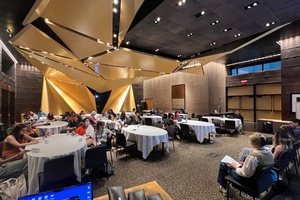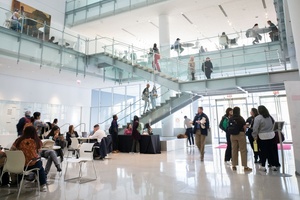Features:
2022 News Nerd Survey: Overall findings
A community that changes and continues its transformation

With each turn, we get a new perspective on this community. (Photo by Rudolf Amman)
Here are the results of the 2022 News Nerd Survey, which offer a snapshot of our community and hopes to understand its needs. We are thankful for the responses. This survey follows the previous ones from 2016 and 2017, and builds on a first look summary we released earlier. In addition, there is a followup salary analysis conducted by Dilcia Mercedes and edited by Soo Oh.
OpenNews received 603 responses to this survey. Over four out of five (501 respondents) came from the US, while 68 respondents came from other countries, mainly Canada, Germany and the UK and Ireland.
Here you will find the highlights from the survey. You can also access an overview of the survey from research firm Network Impact, who administered the survey. We are not releasing the data publicly for privacy reasons, but our hope is to make this data as useful for community members as it is to us at OpenNews, so please reach out if you have questions about this analysis or want to chat about other ways to explore this data. that will inform OpenNews’ work.
Demographics
This survey marked the first time we received more responses from women (52%) than men (44%). We also saw an increase in the responses from nonbinary folks.In terms of race and ethnic identity, the survey showed an increase of folks who selected at least one option that was not white, from 22% in 2017 to 27% in 2022. When looking at respondents who picked a single option for racial identification, Asians represented the second-largest group. Black and Latinos together represented about 8% of respondents. The following chart shows a full breakdown with this methodology by race and gender.
In terms of age, the survey showed that 71% of the respondents are over 30 years old. About 1 out 4 of all the respondents are between 31 to 35 years old.
One way we’ve interpreted these findings is that it looks like the community is growing up with OpenNews! While some of these demographics have changed over time, one thing that has remained consistent across all three of these surveys is that respondents see addressing diversity, equity, and inclusion in journalism as a top priority for the field. We share more about this later in this analysis.
Work environment
The 2022 survey also revealed a wider distribution of locations in the US with responses from 42 states – 7 more than from the previous survey. 25% of respondents are based in the NY area, DC area or LA area. In contrast, these metropolitan areas represented almost 50% of the results of 2017. It is possible that this redistribution was driven by the pandemic.
Now, let’s take a look a closer at the kind of jobs nerds have:
72% have been working in journalism or in journalism-adjacent positions for 6 years or more, an 18 point increase from the 56% in 2017, and 28 points from the 44% in 2016. [This is a faint but promising signal that some news nerds are maintaining careers during a period of significant job losses in the industry.]
The percentage of folks in management roles increased by 6 points, from 28% in 2017 to 34% in 2022.
News nerds continue being an interdisciplinary community, although the majority work in the more traditional tech and journalism roles. When asked about the primary work, respondents most often selected data analysis (30%), editor (28%), reporter (27%), graphics and design (25%), and product or app development (20%).
In a breakdown by gender, the order of the primary work changes. For men the most selected option is data analysis, followed by graphics and design. Women selected most often editor, followed by reporter.
In a breakdown by race, we also observe some differences. While for people of color the most selected primary work is reporter, followed by data analysis. In the case of white people, it changes to data analysis as the most common selection, followed by editor.
Related to this same question, 62% of the respondents selected two or more options to describe their primary job, reflecting on the multiskilled jobs that news nerds do, sometimes with fair remuneration and salaries, and sometimes not.
The option “other” in this same question allowed respondents to write down their primary work. A variety of other roles were present from areas like audience development and engagement, funding and grantmaking, facilitation and coaching, DEIB consultant, and strategy and revenue, among others. This signals that the community is expanding in the journalism ecosystem and that different disciplines have intricate relationships.
Most news nerds (75%) work for news organizations, and many of them (about one in five) work in two or more places. Other common workplaces are organizations that support journalism, academic institutions, and media related startups. While the survey itself doesn’t tell us the reason why some news nerds work in different places, in some cases (3%) is a clear combination of full-time work and teaching, and in others it is possible that work conditions and a shrinking market may be one of the factors that drive to have various ways to generate income.
Industry priorities
When asked about the most urgent needs in journalism, the top six responses fell under the categories:
- Accountability for newsroom bias, harm and culture at all levels (including ownership and management)
- Having competitive and liveable wages at all levels and locations and benefits that support work/life balance
- New and more diverse leaders open to new thinking
- Equitable and equity centering workforce pipelines including leadership training, and
- Increase diversity of thought/perspective/representation across the newsroom including management and leadership
- Sustainable/more diversified funding for news including new ownership models
When looked under the lenses of gender and race, the first priority is always accountability for newsrooms, but as we move forward, the order of the priorities change, in some cases in a considerable way.
For women, competitive and liveable wages was the second most selected priority, followed by new and more diverse leaders, and equitable and equity centering workforce pipelines. For men, the priority competitive and liveable wages dropped to the 6th place, and the second priority is new and more diverse leaders, followed by sustainable and more diverse funding for news and equitable and equity centering workforce pipelines.
Explore the changes by gender in this sortable table:
When analyzed by race, people of color selected new and more diverse leaders, followed by equitable and equity centering workforce pipelines and competitive liveable wages. For white respondents, competitive and liveable wages was the second most selected option, followed by new and more diverse leaders, and sustainable and more diverse funding for new.
Explore the changes by race in this sortable table:
These differences, even though they may seem subtle, are a reflection of the challenges that continue to exist for each group, and an indicator that the work for an equitable, fair and antiracist community is on-going. The DEI Coalition is one place where that work continues, and these findings will help inform future collective action with that group as well.
We hope that, through the snapshot that the News Nerds Survey is, these highlights offer insights about the transformation and growth of our community, as well as the needs and challenges ahead. As we shared in our first look, every turn to the kaleidoscope gives us a new perspective, different depths and nuances. If you have ideas of how else we can explore this data let us know. We would love to hear from you.
Some notes about the data:
- This iteration of the survey comes 5 years after the last one in 2017. Some of the questions were modified to help us to better understand and to inform OpenNews’ strategy. For these reasons, the results are not fully comparable with the previous ones.
- The race and ethnicity analysis in this survey used a different methodology than the previous surveys (2017, 2016) , so the numbers are not comparable.
Organizations
Credits
-
 Mago Torres
Mago Torres
Mago Torres is research project director for OpenNews and the News Nerd Survey. She was a 2018 JSK Journalism Fellow. She is a researcher and journalist. Previously researched for the Panama Papers investigation with the ICIJ, coordinated the journalism program at Universidad Iberoamericana and co-founded Periodistas de a Pie (“Grassroots Journalists”), a network of journalists in Mexico City.



